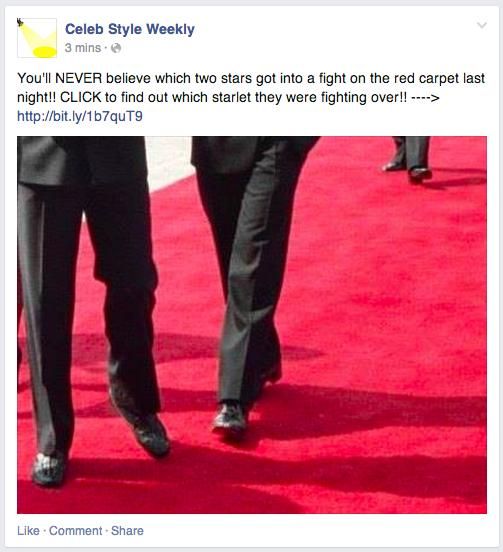Facebook has had enough with people munching off its popularity and it cracking down on all those articles with “click-bait” headlines.
The sensationalist headlines have taken over all forms of social media. You can’t scroll through your Facebook feed without bumping into a story that will test your curiosity levels by telling you “you’ll never believe which stars got into a fight” or offering “ten ways to get the perfect job.”
“’Click-baiting’ is when a publisher posts a link with a headline that encourages people to click to see more, without telling them much information about what they will see. Posts like these tend to get a lot of clicks, which means that these posts get shown to more people, and get shown higher up in News Feed,” Facebook explains.
Basically, these publications have caught on that sometimes people will just click on said articles just to satisfy their curiosity. It doesn’t matter that they close off the tab within a few seconds after figuring out they’d been duped, because the views have been logged and the ads have been displayed.
The social network wants to put a stop to this, to cut down the click-bait stories that continuously pop up in people’s newsfeeds. Facebook claims that it wants to make sure people find relevant information in their feeds and to make sure that posts made by friends aren’t just lost within a sea of articles no one wants to read.
Facebook says that people participating in a survey regarding the type of content they prefer to see in their News Feeds, 80 percent of the time people mentioned headlines that helped them decide whether they wanted to read the full article before they had to click through.
The company has come up with a plan to determine which posts are click-baits and which are OK. “One way is to look at how long people spend reading an article away from Facebook. If people click on an article and spend time reading it, it suggests they clicked through to something valuable. If they click through to a link and then come straight back to Facebook, it suggests that they didn’t find something that they wanted,” reads a blog post from the social network.
Furthermore, they’ll also try to show fewer of these types of stories by looking at the radio of people clicking on the content compare to people discussing and sharing it with their friends. For instance, they explain, if a lot of people click on a link, but few actually click Like or comment on the story, it’s quite likely that they didn’t find something valuable.

 14 DAY TRIAL //
14 DAY TRIAL // 

